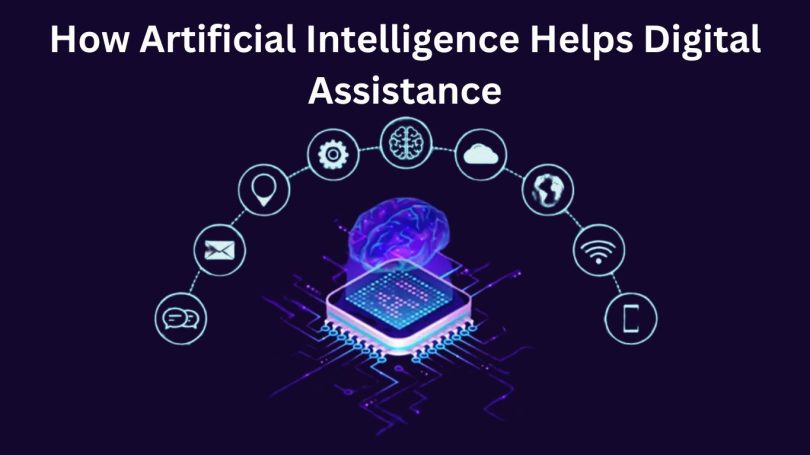Digital assistants have become an inevitable part of our lives. Starting from your alarm clock to managing smart home devices, these virtual assistants help you to do so many duties with just a single voice command.
AI in Digital Assistants:
AI plays a critical role in empowering digital assistants in several key ways.
Understanding User Intent:
Bye-bye to old factory-made, robotic and scripted replies. AI of NLP, a branch of computer science, is the technology that enables digital assistants to interpret the meaning of our words. They get the context of the conversation, the keywords, and the idea behind our request.
Personalization:
Think about a helper who is always aware of your coffee preferences or what news outlet you like best. AI does this by getting a hang of user interactions and historical behaviors. Thus, they can adapt their responses and suggestions according to the needs of an individual.
Enhanced Responses:
AI enables digital assistants to memorize and process information faster. They can check countless databases, compare the results and answer the most pertinent and latest available information. This translates to forecasts with more accuracy, recipes with insight and answers to difficult questions with full depth.
Predictive Capabilities:
AI is the next stage in digital assistants by predicting what we need; making our lives easier. Through our regular and predictable behaviors, they can foresee our needs and accomplish those tasks either before we do it or when we ask for it. Think about the day when your assistant turns the lights on when you come home or reminds you that you need milk when you run out.
Voice Recognition and Biometrics:
AI innovations in voice recognition systems allow virtual assistants to respond with excellent accuracy when there are background noises or when people speak with different accents.
Furthermore, biometrics authentication like voice recognition or facial recognition can play a vital role in making user interactions with digital assistants more secure and customized.
Advantages of AI-Empowered Digital Assistants:
Increased Efficiency:
Completion of tasks and processes becomes more efficient utilizing AI in it; leading to time savings which can be used creatively by users. Consider the fact that you will be setting appointments, sending messages and controlling your smart thermostat using voice commands.
Improved User Experience:
AI tailors the responses according to the individuals and predicts the needs, hence the user experience is more immersive and personalized. Visualize a helper that keeps track of the combinations that one uses and then provides the most suitable opportunities.
Accessibility:
AI has the capacity to overcome different language barriers through translation of various languages, including different dialects and accents. This allows a greater number of people to have access to the information as well as to the assistance that it gives.
24/7 Availability:
In contrast to human helpers, digital assistants that use AI technologies are present 24/7, helping and assisting you in any given time and place. That implies that there is always someone available when a user needs assistance.
Evolving Capabilities:
Natural Language Processing and Artificial Intelligence are the domains which experiencing rapid evolution, with novel methodologies and technologies emerging continually. New advancements are on the way for instance, the conversations could be as natural as one’s chat with a friend, the assistant should be able to detect emotions and adjust its tone based on the user’s mood and can also be integrated in the Internet of Things (IoT) in order to achieve a seamless smart home experience.
Real-World Examples:
Let’s look at some concrete examples of how AI is used in popular digital assistants…
- Siri: Apple’s Siri is an AI that enables voice recognition, natural language processing and knowledge retrieval through AI. People could get Siri to guide them to the desired locations, schedule appointments, or even get individualized restaurant recommendations.
- Alexa: Alexa is powered by Amazon’s AI technology, which enables it to process human language and execute tasks based on the user’s request.
- Google Assistant: Google Assistant is empowered by Google’s huge information store and AI capabilities to offer a comprehensive and customized experience. The users can get answers to complex questions, translate in real-time languages or even let Google Assistant take care of the managing of the shopping lists.
The Future of AI and Digital Assistants:
The future of AI and its digital helpers has many promising prospects ahead of it.
Advancements in AI research could lead to:
More Complex Conversation Capabilities: Imagine having a conversation with your digital assistant as well as with your friend in the same natural way. AI breakthroughs will make virtual assistants capable of grasping the meanings behind the human language and emotions and reacting with sympathy and understanding.
Emotional Intelligence: Virtual assistants with humanoid intelligence could adjust their way of communication in accordance to the mood of the user. Therefore, users would have a more natural and interesting dialogue with the AI.
Integration with the Internet of Things (IoT): A smooth union between AI-based digital assistants and IoT devices could generate the desired result of a sophisticated and well-integrated home environment. Think about a virtual assistant that modifies your temperature or lighting according to your needs.
Summary:
In the end, AI has brought forth a new way for digital assistants, from simply being command-followers to conversational partners. By understanding user’s intent and by addressing their needs, it not only personalizes the digital assistant experience but also enhances it to new levels. The benefits are clear; it leads to higher efficiency, better user experience and equal access for everybody. We will observe conversing with others more naturally, feeling emotions, and being part of the internet of things all leading to a brilliant and connected future world




Leave a Comment